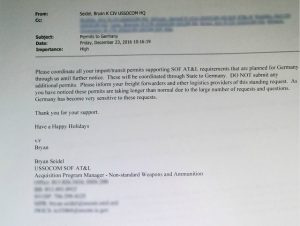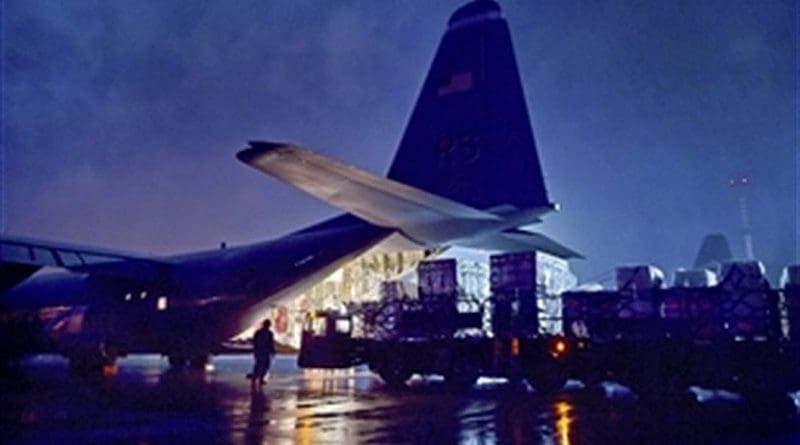German Concerns Spark Pentagon Reroute Of Syria-Bound Arms
The Pentagon has rerouted its weapons supply-line to Syria after officials in Berlin became concerned at the surge in arms being transferred through US bases in Germany.
By Lawrence Mazouk, Ivan Angelovski and Frederik Obermaier*
The Pentagon’s US Special Operations Command Mission, SOCOM, ordered its contractors to stop trucking Soviet-style weapons from the Balkans through Germany after officials in Berlin became concerned about the deliveries.

The message was delivered by SOCOM to 11 US firms it had tasked with buying weapons from across Central and Eastern Europe for Syrian rebels fighting Islamic State, ISIS.
According to the leaked Pentagon email from December 23, 2016, recently obtained by Balkan Investigative Reporting Network, BIRN, and the Organized Crime and Corruption Reporting Project, OCCRP, German authorities had “become very sensitive” to requests from Pentagon contractors for transit licences to transport weapons across their territory to US military bases.
Contractors were told that the State Department would take over responsibility for requesting new transit licences as the permits were “taking longer than normal due to large number of requests and questions [from German authorities]”.
Berlin declined to comment on the nature of its “sensitivities”, but these may be linked to German laws dictating that transit licences for weapons need to be justified with a legal document called an end user certificate which clearly states who will be the final recipient.
However, the licences used by the Pentagon to export weapons for Syrian rebels, and which have been obtained by BIRN and OCCRP, use SOCOM as the final ‘end user’ and specify US military bases in countries such as Germany, Romania, and Turkey as the delivery point.
Jan Paul van Aken, an MP for the left-wing Die Linke party and a member of the German parliament’s arms control committee, said that “once more it is through Ramstein [US air base in Germany] that the USA organises its dirty wars all around the world”.
Germany: A Logistical Hub
Germany has long been a key logistical hub for the US army and is home to one of America’s most important air bases in Europe, Ramstein, as well as a nearby ammunition depot at Miesau, the largest of its kind outside the US.
But these bases’ role in the Syria supply-line has never been acknowledged by authorities in the US or Germany.
In February, Green MP Hans-Christian Ströbele wrote to the German government asking if it had any information about weapons deliveries via Ramstein to Syria. State Secretary Markus Ederer replied it did not, according to correspondence secured by reporters.
SOCOM said it currently does not “store or transit” equipment bound for Syria through German bases and had “specifically directed our contracted vendors” not to do so.
It repeatedly declined to confirm whether it had been moving weapons through Germany to Syria prior to 2017, explaining it had not used “contracted flights” from US bases to do so, a question reporters had not asked.
A contractor involved in the supply-line, who spoke on condition of anonymity, however said that US bases in Germany and Romania had formed a key part of the Pentagon’s vast logistical operation, which saw Eastern Bloc weaponry worth more than $700 million shifted to Syria between September 2015 and May 2017, according to an investigation by BIRN and OCCRP.
The leaked SOCOM email, Pentagon flight cargo paperwork, UN arms export reports and data on transit licences through Germany support this claim.
Following an official request from reporters, Germany’s Economy Ministry revealed an upsurge in weapons transiting to or from US military bases through German territory and onto another country in 2016.
The ministry approved 11 land transit licences that year, significantly more than in any year in the previous decade, when the numbers ranged from one to six.
Three further approvals were made in the first five months of 2017, although authorities declined to provide additional information, including whether these were heading to or leaving from US bases in Germany.
UN arms export reports for 2015 and 2016 also recorded three weapons transfers from Serbia to an end user of a “US military base in Germany”, with the final importing country entered as “Germany”. This type of entry is unprecedented, bar two others in 2016 noting Serbian exports to a “US military base in Romania”.
A vast trove of emails and documents related to Azerbaijan’s state-owned Silk Way air cargo carrier, leaked online in June, also provide further evidence of SOCOM’s use of German bases in 2016 – and the need to reroute after Berlin’s concerns emerged.
These revealed that in January 2017, just weeks after the email warning of Germany’s sensitivities about the weapons transports, 20,000 grenades were dispatched to a SOCOM depot in Bagram airbase in Afghanistan, instead of the original destination – Miesau base in Germany – because of “last minute changes to program circumstances”.
Bagram was being used as a temporary store for SOCOM activities in Syria and Iraq at the time.
The contractor said he believed private deliveries to German bases following the SOCOM diktat had not since resumed.
In March, the rerouting was confirmed in a Pentagon report which noted that an extra $23 million was needed for the Syria programme to cover additional transportation costs before the end of September 2017 because of “the inability to consolidate non-US source weapons and equipment in Europe”.
The Pentagon refused to confirm or deny that its sudden inability to gather Eastern Bloc weapons in Europe was connected to the German concerns, adding that such decisions are made due to “diplomatic” and “logistical” reasons.
The revised route for armaments to Syria remains unclear, but details of recent SOCOM flights on Silk Way, according to the leaked documents, show planes carrying weapons from Azerbaijan to Rijeka in Croatia in May and June, and flights from Kazakhstan to Chicago and Frankfurt, suggesting a variety of new paths to the conflict zone.

